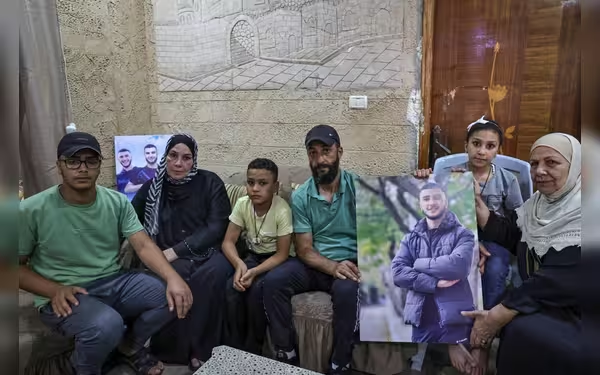Saturday, November 16, 2024 07:28 PM
Tragic Fate of Wael Masha: A Palestinian Teen's Story
- Wael Masha killed shortly after Gaza truce.
- Israeli military actions escalate violence in West Bank.
- Families mourn lost youth amid ongoing conflict.
 Image Credits: arabnewspk
Image Credits: arabnewspkThe tragic story of Wael Masha highlights the human cost of the ongoing conflict in Gaza and the West Bank.
The ongoing conflict in the West Bank and Gaza has led to tragic stories that highlight the human cost of violence and political strife. One such story is that of Wael Masha, an 18-year-old Palestinian who was recently killed by Israeli forces after being released from prison. His life and untimely death reflect the broader issues faced by young Palestinians caught in the cycle of violence.
Wael Masha was initially arrested as a teenager and spent time in an Israeli prison. Upon his release during a brief truce in the Gaza war last November, he was welcomed back to his West Bank refugee camp with joy and celebration. However, less than a year later, his friends carried his lifeless body through the same streets, a stark reminder of the dangers that young men like him face in the region.
Israeli authorities have stated that their military operations are necessary to combat threats from Palestinian militants. They argue that these actions are a response to the security risks posed by individuals like Masha, who they label as armed militants. However, many families, including Masha's, believe that the Israeli military's actions only exacerbate the situation, leading to more violence and revenge-seeking behavior among the youth.
After his release, Masha expressed a desire for “jihad,” a term that signifies a struggle or fight against perceived oppression. In his will, he instructed his mother not to mourn his death but to celebrate it, indicating a deep commitment to his cause. His mother, Hanadi Masha, remembers him as a young man with dreams of studying and repairing technology, a stark contrast to the image of a militant that some may portray.
The impact of the ongoing conflict is evident in the statistics. Since the outbreak of violence following Hamas's attack on October 7, at least 680 Palestinians have been killed by Israeli forces, while 24 Israelis have lost their lives in Palestinian attacks. The cycle of violence continues, with young men like Masha and his friend Tariq Daoud being caught in the middle.
Tariq, who was also released during the same truce, faced similar experiences in prison. He reported being beaten and coerced into making false confessions. After his release, he too became involved with armed groups, illustrating how the prison experience can alter the trajectory of young lives.
As the conflict rages on, the stories of these young men serve as a poignant reminder of the human cost of war. Families are left to grieve, and communities are torn apart. Masha's mother continues to honor her son by sharing his story with his younger siblings, hoping to keep his memory alive. She attended his graduation ceremony posthumously, celebrating his achievements in mobile phone repair and cybersecurity.
The tragic tale of Wael Masha and others like him underscores the urgent need for dialogue and understanding in the region. The cycle of violence not only claims lives but also extinguishes the hopes and dreams of countless young individuals. It is essential for all parties involved to seek peaceful resolutions to prevent further loss and to foster a future where young people can aspire to build lives free from fear and conflict.













